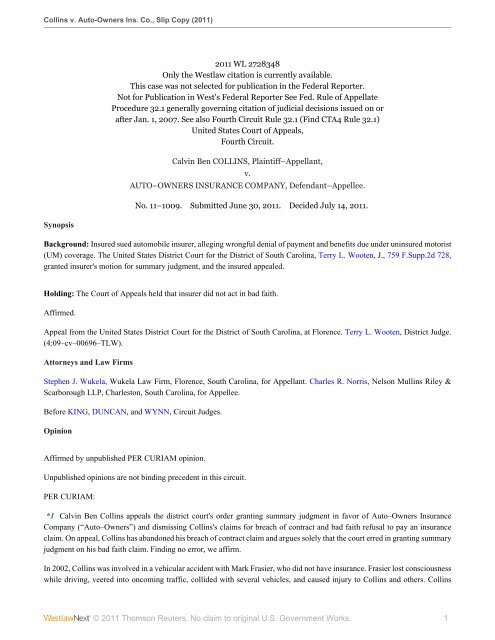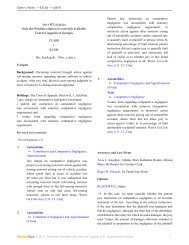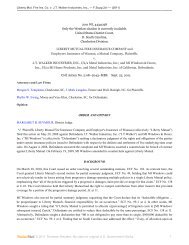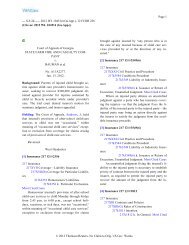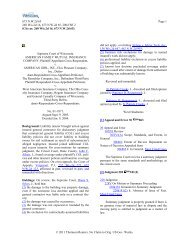Collins v. Auto Owners - Insurance Coverage Corner
Collins v. Auto Owners - Insurance Coverage Corner
Collins v. Auto Owners - Insurance Coverage Corner
- No tags were found...
You also want an ePaper? Increase the reach of your titles
YUMPU automatically turns print PDFs into web optimized ePapers that Google loves.
<strong>Collins</strong> v. <strong>Auto</strong>-<strong>Owners</strong> Ins. Co., Slip Copy (2011)Synopsis2011 WL 2728348Only the Westlaw citation is currently available.This case was not selected for publication in the Federal Reporter.Not for Publication in West's Federal Reporter See Fed. Rule of AppellateProcedure 32.1 generally governing citation of judicial decisions issued on orafter Jan. 1, 2007. See also Fourth Circuit Rule 32.1 (Find CTA4 Rule 32.1)United States Court of Appeals,Fourth Circuit.Calvin Ben COLLINS, Plaintiff–Appellant,v.AUTO–OWNERS INSURANCE COMPANY, Defendant–Appellee.No. 11–1009. Submitted June 30, 2011. Decided July 14, 2011.Background: Insured sued automobile insurer, alleging wrongful denial of payment and benefits due under uninsured motorist(UM) coverage. The United States District Court for the District of South Carolina, Terry L. Wooten, J., 759 F.Supp.2d 728,granted insurer's motion for summary judgment, and the insured appealed.Holding: The Court of Appeals held that insurer did not act in bad faith.Affirmed.Appeal from the United States District Court for the District of South Carolina, at Florence. Terry L. Wooten, District Judge.(4:09–cv–00696–TLW).Attorneys and Law FirmsStephen J. Wukela, Wukela Law Firm, Florence, South Carolina, for Appellant. Charles R. Norris, Nelson Mullins Riley &Scarborough LLP, Charleston, South Carolina, for Appellee.Before KING, DUNCAN, and WYNN, Circuit Judges.OpinionAffirmed by unpublished PER CURIAM opinion.Unpublished opinions are not binding precedent in this circuit.PER CURIAM:*1 Calvin Ben <strong>Collins</strong> appeals the district court's order granting summary judgment in favor of <strong>Auto</strong>–<strong>Owners</strong> <strong>Insurance</strong>Company (“<strong>Auto</strong>–<strong>Owners</strong>”) and dismissing <strong>Collins</strong>'s claims for breach of contract and bad faith refusal to pay an insuranceclaim. On appeal, <strong>Collins</strong> has abandoned his breach of contract claim and argues solely that the court erred in granting summaryjudgment on his bad faith claim. Finding no error, we affirm.In 2002, <strong>Collins</strong> was involved in a vehicular accident with Mark Frasier, who did not have insurance. Frasier lost consciousnesswhile driving, veered into oncoming traffic, collided with several vehicles, and caused injury to <strong>Collins</strong> and others. <strong>Collins</strong>© 2011 Thomson Reuters. No claim to original U.S. Government Works. 1
<strong>Collins</strong> v. <strong>Auto</strong>-<strong>Owners</strong> Ins. Co., Slip Copy (2011)was insured by <strong>Auto</strong>–<strong>Owners</strong> under three uninsured motorist policies of $500,000 each. Following the accident, <strong>Collins</strong> madeclaims totaling $1.5 million, but <strong>Auto</strong>–<strong>Owners</strong> declined to pay these claims. <strong>Collins</strong> ultimately brought suit against Frasierin South Carolina court; the litigation was captioned <strong>Collins</strong> v. Frasier. <strong>Auto</strong>–<strong>Owners</strong>, as the carrier of <strong>Collins</strong>'s uninsuredmotorist liability coverage, defended the suit.Prior to trial in <strong>Collins</strong> v. Frasier, <strong>Collins</strong>'s attorney and attorneys for Frasier and <strong>Auto</strong>–<strong>Owners</strong> engaged in extensive settlementnegotiations. <strong>Collins</strong> demanded several different amounts during the course of the negotiations, but never less than $1 million.<strong>Auto</strong>–<strong>Owners</strong> offered $100,000, although there is evidence in the record that at least one <strong>Auto</strong>–<strong>Owners</strong> claims adjuster valuedthe claim at $150,000. <strong>Auto</strong>–<strong>Owners</strong> believed that Frasier had legitimate defenses to both liability and damages, and thus didnot offer a greater settlement amount. <strong>Collins</strong> insisted that <strong>Auto</strong>–<strong>Owners</strong>' fair evaluation of his claims was considerably higherthan $100,000 and accused his insurer of bad faith. <strong>Auto</strong>–<strong>Owners</strong> believed that <strong>Collins</strong>'s demands were excessive, and thuswould not offer a higher amount.The jury ultimately returned a verdict for Frasier, finding that he had suffered a sudden, unforeseeable incapacity to operatehis vehicle and was thus not liable to <strong>Collins</strong>. See <strong>Collins</strong> v. Frasier, 378 S.C. 249, 662 S.E.2d 464, 465 (2008). This verdictwas affirmed on appeal. See id. In 2006, during the pendency of <strong>Collins</strong> v. Frasier, <strong>Collins</strong> sued <strong>Auto</strong>–<strong>Owners</strong> in state courtfor breach of contract and bad faith failure to settle an insurance claim. <strong>Auto</strong>–<strong>Owners</strong> removed the case to the district courtpursuant to the court's diversity jurisdiction.In the district court, <strong>Collins</strong> argued that <strong>Auto</strong>–<strong>Owners</strong> breached the insurance agreement and acted in bad faith. The districtcourt granted summary judgment in favor of <strong>Auto</strong>–<strong>Owners</strong>, dismissed the claims, and this timely appeal followed.We review de novo a district court's order granting summary judgment, viewing the facts and inferences in the light mostfavorable to the nonmoving party. Rowzie v. Allstate Ins. Co., 556 F.3d 165, 167 (4th Cir.2009). Summary judgment isappropriate when no genuine issue of material fact exists and the moving party “is entitled to judgment as a matter of law.”Fed.R.Civ.P. 56(a). Summary judgment will be granted unless “a reasonable jury could return a verdict for the nonmovingparty” on the evidence presented. Anderson v. Liberty Lobby, Inc., 477 U.S. 242, 248, 106 S.Ct. 2505, 91 L.Ed.2d 202 (1986).*2 Under South Carolina law (which governs the substantive questions at issue in this diversity suit), an insurer thatunreasonably refuses to settle a claim with an insured within policy limits is subject to liability in tort. Tyger River Pine Co.v. Md. Cas. Co., 170 S.C. 286, 170 S.E. 346 (1933). “[I]f an insured can demonstrate bad faith or unreasonable action by theinsurer in processing a claim under their mutually binding insurance contract, he can recover consequential damages in a tortaction.” Nichols v. State Farm Mut. <strong>Auto</strong>. Ins. Co., 279 S.C. 336, 306 S.E.2d 616, 619 (1983). Because, under South Carolinalaw, a bad faith action exists separately from an action in contract, a bad faith claim may exist even in the absence of anyviolation of an insurance contract provision. See Tadlock Painting Co. v. Md. Cas. Co., 322 S.C. 498, 473 S.E.2d 52, 55 (1996).The elements of a bad faith refusal to pay a claim action are(1) the existence of a mutually binding contract of insurance between the plaintiff and the defendant; (2) refusal by the insurerto pay benefits due under the contract; (3) resulting from the insurer's bad faith or unreasonable action in breach of an impliedcovenant of good faith and fair dealing arising on the contract; (4) causing damages to the insured.Howard v. State Farm Mut. <strong>Auto</strong>. Ins. Co., 316 S.C. 445, 450 S.E.2d 582, 586 (1994).We have reviewed the record, including the parties' correspondence and <strong>Auto</strong>–<strong>Owners</strong>' internal memoranda, and we cannotconclude, on these facts, that <strong>Auto</strong>–<strong>Owners</strong> acted in bad faith. It is clear that even before the jury's verdict in <strong>Collins</strong> v. Frasier,<strong>Auto</strong>–<strong>Owners</strong> had legitimate reservations about the validity of <strong>Collins</strong>'s claims. In contemporaneous memoranda and letters to<strong>Collins</strong>'s attorney, <strong>Auto</strong>–<strong>Owners</strong>' attorneys and claims adjusters expressed their belief that Frasier had meritorious defenses toboth liability and the extent of <strong>Collins</strong>'s damages. While <strong>Collins</strong> (and his attorney) clearly believed that <strong>Collins</strong> was entitled tomore than the $100,000 offered by <strong>Auto</strong>–<strong>Owners</strong>, the fact that the parties had different estimations of the value of a claim isnot, under South Carolina law, evidence of bad faith on the part of the party offering the lower amount.© 2011 Thomson Reuters. No claim to original U.S. Government Works. 2
<strong>Collins</strong> v. <strong>Auto</strong>-<strong>Owners</strong> Ins. Co., Slip Copy (2011)<strong>Collins</strong> argues, though, that because internal <strong>Auto</strong>–<strong>Owners</strong> documents suggest that at least one claims adjuster initially valuedhis claim at $150,000, <strong>Auto</strong>–<strong>Owners</strong>' $100,000 offer represented less than its own estimate of what the claim was worth, andwas thus made in bad faith. We do not agree. “If there is reasonable ground for contesting a claim, there is no bad faith” evenwhere the insurer makes no offer to settle. Snyder v. State Farm Mut. <strong>Auto</strong>. Ins. Co., 586 F.Supp.2d 453, 458 (D.S.C.2008)(citing Crossley v. State Farm Mut. <strong>Auto</strong>. Ins. Co., 307 S.C. 354, 415 S.E.2d 393, 397 (1992)). Thus, because <strong>Auto</strong>–<strong>Owners</strong>had a reasonable ground for contesting the claim, and was not even obligated to make the initial $100,000 settlement offer, wecannot say it exercised bad faith in failing to make a higher offer.*3 We accordingly affirm the judgment of the district court. We dispense with oral argument because the facts and legalcontentions are adequately presented in the materials before the court, and argument would not aid the decisional process.AFFIRMED.End of Document© 2011 Thomson Reuters. No claim to original U.S. Government Works.© 2011 Thomson Reuters. No claim to original U.S. Government Works. 3


